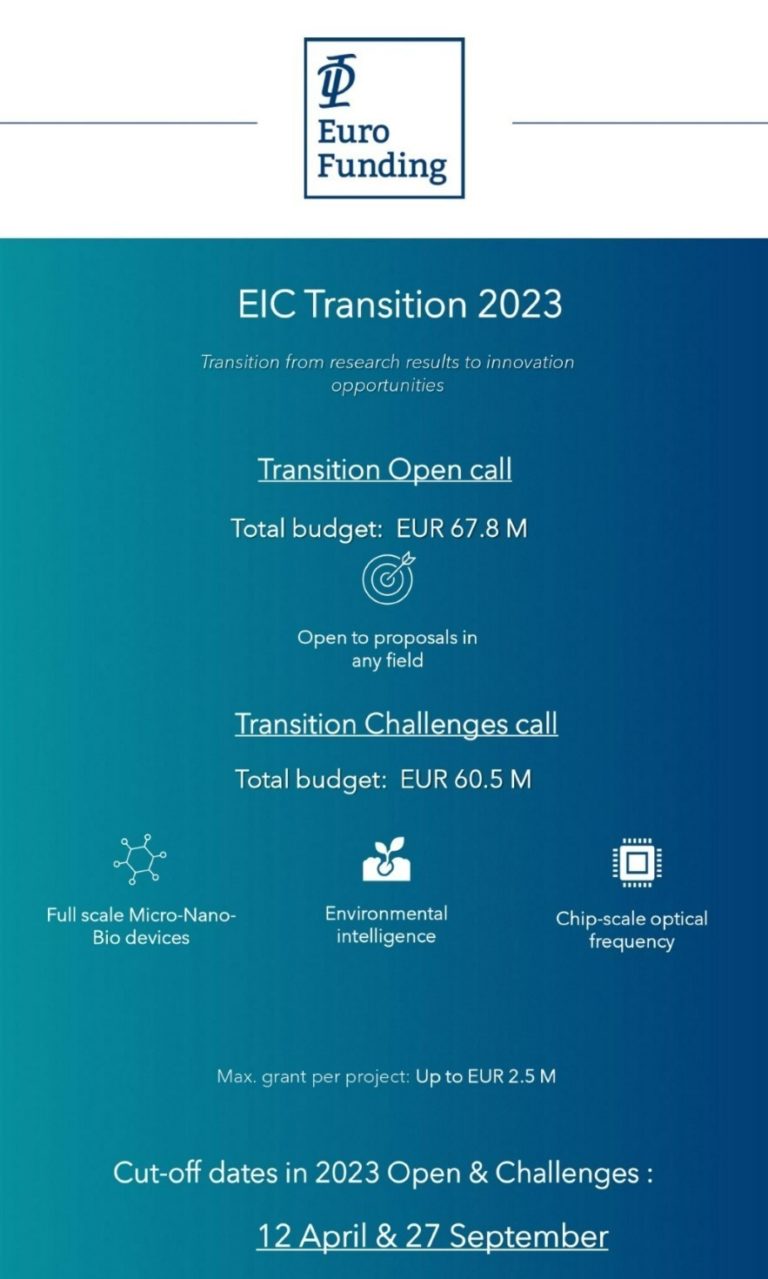
Space & defence: enhancing dual-use satellite technologies in EDF 2025
Space & defence: enhancing dual-use satellite technologies in EDF 2025 David García ArrateSettings The European Defence Fund (EDF) 2025 continues to drive innovation in space
The European Innovation Council (EIC) will invest EUR 128.3 million this year in projects with technology maturation from proof of concept to validation. The 2 deadlines available in 2023 are 12 April and 27 September.
Under the Transition funding scheme, the EIC supports several pathways beyond fundamental research, from technology development and product design to business modelling and commercialisation strategy to reach the market. Proposals are expected that intellectual property is formally protected in an adequate way.
The core element to obtain funding under this instrument means that your idea has already been validated in lab, the technology is ready for next steps and you have made some explorations of early market performance. Your end point is to obtain a functional version of the technology tested or demonstrated in relevant environment. This means a Technology Readiness Level from 4 to 6 (TRL 4-6). Thus, the activities must address market readiness towards commercialisation and deployment and aspects of regulation, certification and standardisation.
Restrictions
Proposals to be funded under this instrument are restricted to projects based on results coming from: EIC Pathfinder projects, European Research Council Proof of Concept projects and European Defence Fund (EDF).
Eligibility criteria
This funding opportunity is open to single applicants such as Small and Medium Enterprises (SMEs), spin-offs, start-ups, research organisations and universities, as well as small consortia with a maximum of five partners. It is an excellent opportunity for those interested in developing innovative solutions that can be used to address challenges in their respective fields.
For specific eligibility rules, see here.
Applicants to EIC Transition can submit proposals through open and challenges calls. Open call has not predefined thematic priorities and is open to proposals in any field. Challenges call funds predefined thematic areas of emerging and strategic technologies. The total indicative budget for challenges call is EUR 60.5 million, of which EUR 40.5 million will be funded through Next Generation EU which contributes to objectives to rebuild greener, more digital and more resilient Europe. The three challenges in 2023 are the following:
This challenge aims to realise and validate a fully integrated Micro-Nano-Bio device or system hinging on Micro-Nano-Bio modules developed under previous EU-funded projects. The development of devices or systems should lead to a high-impact technological driven by market needs.
Expected outcome: realisation of significant progress in Micro-Nano-Bio systems to a level of technological maturity suitable for exploitation, as well as positioning the European Micro-Nano-Bio ecosystems at the leading edge of product innovation.

This challenge focus on demonstrating novel devices, sensors or technologies that have a clear and quantifiable advantage compared with existing alternatives for similar class of problems or applications.
Expected outcome: reduction of environmental pollution through technologies demonstrated by means of safe and sustainable pilot-scale prototypes able to perform environmental monitoring and/or remediation actions. Enable an evidence-based environmental policy as well as improving and simplifying the environmental policy making through environmental intelligence. Promotion of the development of an EU ‘’environmental monitoring/remediation-based’’ economy. Exploitation strategy and a credible business model for the deployment and use of the novel device, sensor or technology in the relevant environment.
Objectives: this challenge seeks to advance technological developments of the light stated in driven nonlinear systems and to develop novel platforms for chip-scale frequency combs. Support successful transition from experimental proof of concept or technology validated in lab to technology validated or demonstrated in relevant environment.
Expected outcome: foster skills, talent, and innovation in semiconductor technologies, specifically for using advanced materials and in the integration of photonics and microelectronics in cutting-edge chips.
EU contribution for each project is up to EUR 2.5 million to validate and demonstrate technology in application-relevant environment and duration between 1 and 3 years.
Before applying we recommend you have these 3 basic steps clear: know the market you plan to enter, know the competition you will face and know the problem you are solving.
To know full details on the EIC Transition challenges and check if your project idea has a chance of being funded under this EU call, contact us here.

Space & defence: enhancing dual-use satellite technologies in EDF 2025 David García ArrateSettings The European Defence Fund (EDF) 2025 continues to drive innovation in space

Health & medical innovation: the role of defence research in civilian healthcare Mónica GarcíaSettings The European Defence Fund (EDF) 2025 determine to support groundbreaking medical

Cybersecurity & AI: Advancing Europe’s defence and digital sovereignty with EDF 2025 Patrizio RicciSettings The digital landscape is evolving at an unprecedented pace, bringing both
